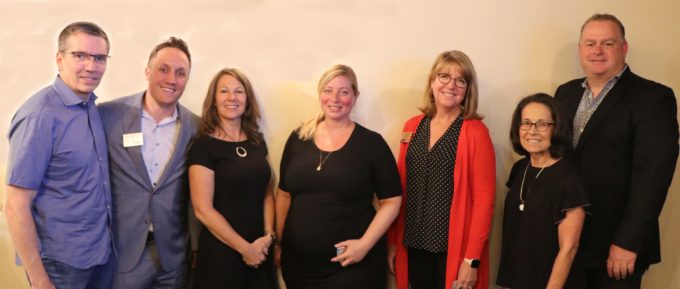At Denver’s Start-Up Week in September, six panelists discussed the professional caregiver crisis in Colorado moderated by Karen Brown with iAging and Aging 2.0 Denver Chapter. The panelists included Jayne Keller, VP of Operations for Christian Living Communities; Francis LeGasse, President and Chief Operations Officer for Assured Assisted Living; Katherine Wells, CEO and Founder for Serenity; John Gray, COO and Co-Founder for iEldra; Doug Kittelsen, CTO and Co-Founder for CareTribe; and Sarah Elliot, Care Transitions Coordinator for Vivage Senior Living.

Panelists (l-r): Doug Kittelsen, Francis LaGasse, Katherine Wells, Sarah Elliot, Jayne Keller, Karen Brown, & John Gray
There is a professional caregiver crisis in the U.S. with a shortage of 7.8 million caregivers expected by 2026. This presents an industry wide challenge for senior living, home healthcare, state government, corporations, older citizens, and their families. This also presents an enormous opportunity for finding new solutions to meet the caregiver shortage problem.
Karen gave a brief introduction and surveyed the audience with responses by 95% entrepreneurs and 5% professional caregivers. Karen asked the panelists what opportunities and challenges they face in their operations and any words of wisdom for the senior living industry.
Jayne indicated with the low 2.8% unemployment in Denver, it’s a challenge to find the skilled staff needed for her senior living operations. Unfortunately, caregiving isn’t a desirable job, so turnover is high between 40 to 60% annually. She uses lots of technology for the residents to overcome the caregiving shortage.
One of her pilot projects has been successful with better patient monitoring and creating detailed patient records for better care like the medical industry does for their patients. By having the RNs, CNAs, and CGs using artificial intelligence and software in prescribing correct doses of medicine to patients, less problems are the norm. Better communication between employees and patients and using device for better monitoring of residents is a must.
Sarah focused on finding skilled nursing staff, thus partnered with schools to help with the nursing shortage. She also indicated many families must look at intergenerational care as one solution. Another issue is seniors living at home have social isolation problems with depression and chronic health problems. She feels more entrepreneurs need to enter the caregiving industry ad find better solutions for senior living. She works with partners such as Visible Hand and Inovonics to provide beneficial caregiving solutions.
Frances indicated getting millennial students interested in senior care presents a challenge as 85% of is patients have cognitive issues. Affordable housing is another problem in attracting staff in the Denver area. He also mentioned many residents stay longer as they move from independent to assisted living and some move into memory care.
The bigger problem is many families run out of money to take care of their elders, thus less expensive solutions are needed for senior care. He also mentioned predictive analytics is very important for dispensing meds and monitor for overdosing problems, especially for dementia patients. Also make the caregiving jobs more empowering and interesting, so it’s not routine or boring.
Karen said she has to pay $150K/year for her distant mother’s professional caregiving services. Most people cannot afford professional services, thus must find less expensive caregiving solutions. She also recommends finding solutions that can be brought to the market faster than two years. Another issue is the transportation issue as caregivers may spend too much time on getting groceries, doctor visits, obtaining meds, thus increasing more stress for elders and caregivers.
John indicated his challenge is with remote caregiving services for many families with distant elders living alone. He said most elders prefer to live at home and is more affordable than living in a senior living facility. His company provides technology solutions such as motion sensors for all rooms to monitor and track the elders for $49/month. This provides a higher degree of senior security for many families.
Doug’s CareTribe service helps many families that have elders living at home. His goal is to keep elders out of assisted living. He mentioned any new start-up should research the market before creating any new product and solutions. The FDA must approve many of the home medical devices before market availability. The bottom line is finding the right cost effective solution providing a benefit to customers and of course making a profit.
Katherine explained most families may need caregiving services for ten years. Home healthcare is a $7.6 trillion industry and because of the shortage, more technology tools are needed such as daily patient or resident monitoring using software apps and devices.
Karen asked the audience for their questions. Dr. Brahma Sharma, a pharmagenetics consultant and author, indicated his DNA test is one solution for prescribing meds to patients and prevent over-dosing and possible death problems, that affects one in four patients annually. He indicated there are over 200 meds on the adverse reaction warning list provided by the FDA. Another audience member suggested more education is needed for training professional and family caregivers.
Several final thoughts provided by the panelists included partnering with new tech vendors and entrepreneurs in finding new solutions for senior living and heme healthcare. One panelist felt assisted living and memory care may result in a new level of senior care living and cities need to find a better support system for seniors. Another said more support people will be needed for Medicaid as governments will have to spend more money on the aging community.
Thanks to Aging 2.0 for presenting the caregiver crisis and the panelists for their beneficial information
